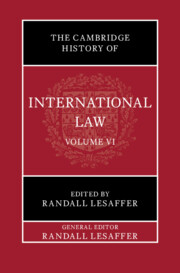Book contents
- The Cambridge History of International Law
- The Cambridge History of International Law
- Frontispiece
- The Cambridge History of International Law
- Copyright page
- Contents
- Plates
- Contributors
- Preface
- Abbreviations
- Part I International Law in Renaissance Europe (1492–1660)
- Part II International Law in Old Regime Europe (1660–1775)
- 12 The Law of Nations in Old Regime Europe
- 13 Territory and Jurisdiction in Old Regime Europe
- 14 The Law of the Sea in Old Regime Europe
- 15 War and the Use of Force in Old Regime Europe
- 16 Warfare on land in Old Regime Europe
- 17 Maritime Warfare in Old Regime Europe
- 18 Peacemaking in Old Regime Europe
- 19 Trade in Old Regime Europe
- 20 Diplomacy in Old Regime Europe
- 21 Dispute Settlement in Old Regime Europe
- 22 The Ottoman Encounter and the Law of Nations in the Old Regime
- Index
- Plate Section (PDF Only)
- References
13 - Territory and Jurisdiction in Old Regime Europe
from Part II - International Law in Old Regime Europe (1660–1775)
Published online by Cambridge University Press: 22 April 2025
- The Cambridge History of International Law
- The Cambridge History of International Law
- Frontispiece
- The Cambridge History of International Law
- Copyright page
- Contents
- Plates
- Contributors
- Preface
- Abbreviations
- Part I International Law in Renaissance Europe (1492–1660)
- Part II International Law in Old Regime Europe (1660–1775)
- 12 The Law of Nations in Old Regime Europe
- 13 Territory and Jurisdiction in Old Regime Europe
- 14 The Law of the Sea in Old Regime Europe
- 15 War and the Use of Force in Old Regime Europe
- 16 Warfare on land in Old Regime Europe
- 17 Maritime Warfare in Old Regime Europe
- 18 Peacemaking in Old Regime Europe
- 19 Trade in Old Regime Europe
- 20 Diplomacy in Old Regime Europe
- 21 Dispute Settlement in Old Regime Europe
- 22 The Ottoman Encounter and the Law of Nations in the Old Regime
- Index
- Plate Section (PDF Only)
- References
Summary
This chapter is a survey of the legal languages used to govern territory, sovereignty and the right of a ruler within a polity. Debates were heavily dominated by feudal and private law-concepts. Sovereigns maintained the diversity of privileges in the territories ruled in the setting of a composite monarchy. Claims and titles could or could not entail consequences for sovereignty. Reservations and exceptions to full internal sovereignty were not uncommon. Succession quarrels (often causes of war), could be solved by treaty, often in conflict with domestic constitutional rules and principles. Mixed polities (Poland-Lithuania, Holy Roman Empire) offered a broad range of argumentative topoi to either confirm or combat overlordship. Internal German questions could quickly escalate to the field of the law of nations through the game of alliances and guarantees. Although republican forms of monarchy and republican oligarchies were on the decline in the seventeenth and eighteenth centuries, their legal agency was not contested. In extra-European dominions of European sovereigns, the chain of reasoning was significantly lighter, as feudal arguments rarely came into play. Conversely, the agency of subaltern actors in establishing boundaries, or the treatment of native Americans as either allies or subjects provide original avenues of research.
- Type
- Chapter
- Information
- The Cambridge History of International Law , pp. 421 - 465Publisher: Cambridge University PressPrint publication year: 2025

